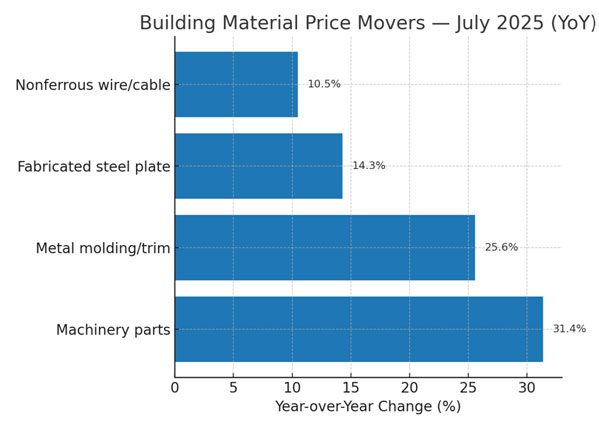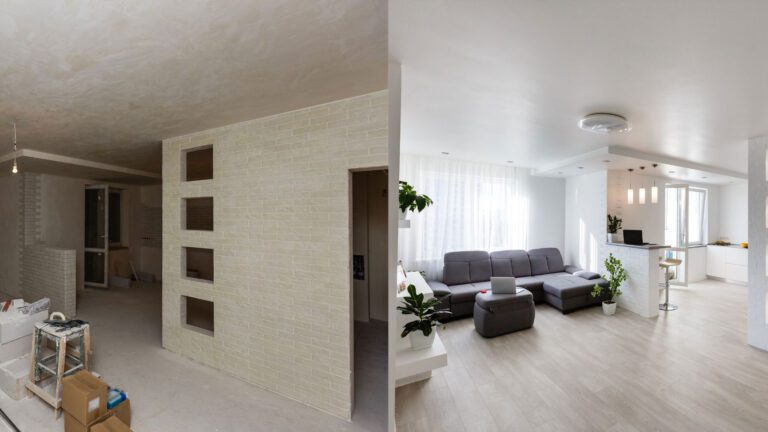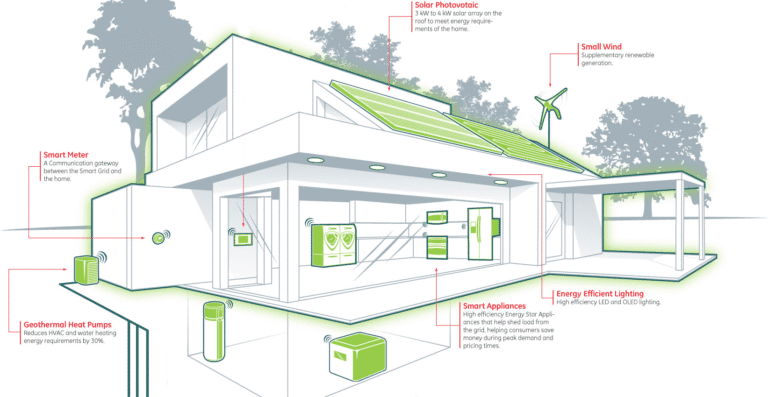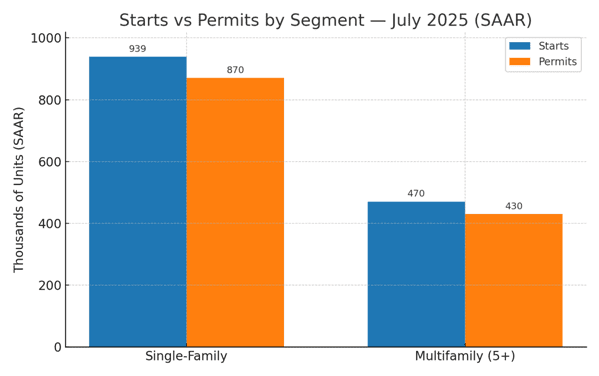ESCROW.COM Removes the Gamble and Helps Protect Your Investment
Materials Watch: Metals & Machinery Parts Are Running Hot — How to Bid Safely
Escalation language, alternates, and procurement moves that protect your margin.
Material costs haven’t fallen off a cliff; in several metals‑heavy categories and machinery parts, they’ve been running hotter than the headlines suggest. The risk isn’t just prices rising; it’s quotes expiring before the owner signs. That gap between “estimate day” and “purchase day” is where profit disappears.

Figure 3. Building Material Price Movers — July 2025 YoY change. Source: industry tracking of PPI/price indices.
Here’s a no‑drama way to protect yourself without scaring the client away.
1) Add an escalation clause that clients actually accept.
Keep it short, specific, and tied to real paperwork. For example:
“Pricing is valid for 30 calendar days. If supplier quotes change after acceptance, the contract sum will adjust by the documented difference in affected line items. Contractor will submit vendor quote copies as backup.”
It’s plain English, objective, and hard to fight because it’s anchored to documentation—not vague indexes.
2) Offer Good/Better/Best alternates in metals‑heavy scopes.
If your base is steel or aluminum, present at least one alternate that reduces exposure: modified profiles, different gauge, or a coated product with better availability. Label the schedule impact next to each option so owners can trade price against time with their eyes open.
3) Shorten the window between “yes” and “buy.”
When the client verbally approves, switch to “procure now” mode: convert the BOQ into POs the same day. If cash is the bottleneck, propose a materials deposit held in a dedicated account; show the client the PO and the receipt so they know funds went to their job.
4) Lock delivery windows with your supplier.
Ask for a defined ship week on the quote and a named contact you can escalate to. If the supplier won’t commit, assume the longer lead and communicate that date to the owner now—not when you miss it later.
5) Keep substitutions pre‑approved.
Submit a one‑page substitution matrix at contract time. That way, if something goes sideways, you’re swapping apples for apples within pre‑approved bounds, not renegotiating under pressure.
Client talk track you can paste into emails:
“We’ll hold pricing for 30 days. If you’re ready, we’ll place materials immediately and protect your schedule. If we slip past the hold window, any vendor‑documented increases will be passed through at cost; we’ll send the backup paperwork with the change.”
The goal isn’t to win every job—it’s to win work you can deliver at a profit with time certainty. Clear terms and fast purchasing beat wishful thinking every single time.
How many times have you stepped into a country club restroom or upscale dining space and felt that quiet, unmistakable sense of refinement? The air seems softer, the lighting warmer, even the water flows differently. Learn more…
Part of Construction Digital Toolbox brought to you by Contractors Junction. This Publication includes a Project Kickoff Checklist. Learn more…
Part of Construction Digital Toolbox brought to you by Contractors Junction. This Publication includes a FREE “Scope of Work” print and save PDF. Learn more…
Part of Construction Digital Toolbox brought to you by Contractors Junction. This Publication includes a FREE print and save “Change Order PDF“. Learn more…
The trap happens when a great operator assumes the same drive and focus that made them efficient in the field will automatically translate to running a company. It rarely does. The job shifts from producing work to managing people and resources, and those who fail to make that shift often end up overworked, underpaid, and burned out. Learn more…
Sustainability isn’t a passing trend—it’s reshaping how the construction industry operates. Contractors who adapt now will find themselves ahead of the curve as clients, architects, and local governments push for energy-efficient, environmentally responsible projects. Learn more…
The latest federal housing data delivered a mixed message that matters directly to your schedule and cash flow: housing starts ticked up, while building permits slipped. PDF”. Learn more…
Regulators have advanced a national heat illness prevention rule, and regardless of the final text, the expectations are already clear: hydrate crews, plan work/rest, train supervisors, and document what you’re doing. Learn more…
Affiliate Disclaimer: This site uses affiliate links. We may earn a commission when you click.












